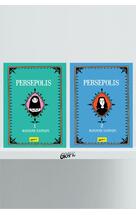Satrapi's voice is as artfully artless as her graphic style
Like many young Iranians, Satrapi proceeds with a life of well-hidden pleasures, close calls, periodic arrests and constant harassment. The end is a given -- the very existence of the two volumes of ''Persepolis'' attests that she will finally reach her limit and go abroad again, this time for good. Satrapi's story is compelling and extremely complex, not simply in its windings and reversals of fortune but in its manifold ironies and acknowledged contradictions. It would have made a stirring document no matter how it was told, but the graphic form, with its cinematic motion and its style as personal as handwriting, endows it with a combination of dynamism and intimacy uniquely suited to a narrative at once intensely subjective and world-historical.
And it is wildly charming. Satrapi's voice is as artfully artless as her graphic style, never giving any indication of effort or calculation but simply communicating, in a way that feels unmediated, like a letter from a friend, in this case a wonderful friend: honest, strong-willed, funny, tender, impulsive, self-aware. It's hard saying goodbye at the end, but the end of the story marks the beginning of her ability to tell it.

